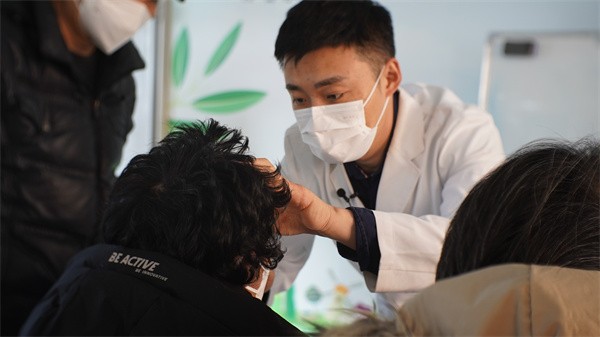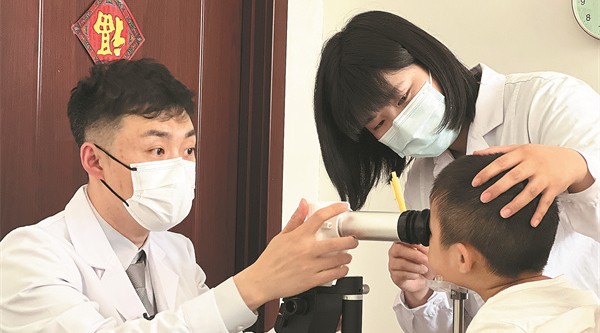
Tao checks the eyes of people with leukemia in Beijing in February. [Photo provided to China Daily]
Three years ago, oculist Tao Yong, director of the ophthalmology department at Beijing Chaoyang Hospital, became a household name in China in an unexpected way. He was badly injured by a former patient, despite having tried his best to save the vision of the man, who had previously undergone multiple surgeries by other doctors.
The attack triggered a wave of reaction on China's social media, not only because it was a repeat of similarly alarming attacks on doctors that had shocked the public, but because Tao, now 43, is a highly acclaimed specialist in his area, who was just caring for his patients, and seemed to have done nothing to warrant such severe injury.
Numerous people expressed anger toward the brutal behavior, care for Tao, and pity for his injuries, which have made it difficult for him to perform complicated eye operations.
Facing the praise, flowers and pain head on, Tao has accepted his reality, shifted his direction, and is still striving to realize his original aspiration of ensuring nobody has to suffer from blindness in the future.

Oculist Tao Yong (left), director of the ophthalmology department at Beijing Chaoyang Hospital, examines the eye of a child with leukemia in Beijing last year as part of a volunteer program.[Photo provided to China Daily]
Tao still feels discomfort in his left hand from time to time. "Sometimes it prickles, or feels cold. The sense of touch is diminished. I can make big movements like balling my hand into a fist, but can't make the small movements needed for performing intricate surgeries," he tells China Daily, adding that he can only conduct a few simple procedures now.
In 2020, Tao was attacked by Cui Zhenguo, who, brandishing a cleaver, slashed at Tao's head, neck, left hand and arm as he was examining another patient. He was rushed to the ICU, and stayed there for two weeks in critical condition.
Those were the darkest days of his life. Before that, Tao had tried to do his best as a doctor and had achieved an admirable resume. At just 35 years old, he had ascended to the position of chief physician, the highest professional rank for a doctor in China, with 98 Science Citation Index essays to his name. He has worked to cure uveitis, a complicated eye problem that can lead to blindness, becoming the last hope for many patients with the disease.
He treated his patients well, meeting about 100 patients a day when he provided outpatient care, and often spent his own money to help many poor patients. He even bore the pain in his back, caused by a previous operation, for two hours as he conducted the surgery on Cui, never considering that the patient would one day cause him great harm in such a brutal way.
Less than four months after the incident, Tao returned to his position. Since it's difficult for him to perform operations like before, these days he pays more attention to his research, public welfare undertakings and popularizing medical knowledge among the public.
"I cannot perform intricate eye surgeries because of the injuries on my hand, but I have never thought of my life as being shadowed by darkness, as I have never ceased my research. Research is a path where the more I go forward, the fewer counterparts I can see. I don't mind walking with a slow pace, but I don't want to stop," Tao said in an interview last year.
Although sometimes showing similar symptoms, eye problems can be caused by numerous factors, such as viruses, bacteria, fungi and parasites. It's important for oculists to be able to identify those reasons and treat the patients on the basis of sound judgment, according to Tao.
About a decade ago, he started to study intraocular fluid examination technology, which means that, by drawing a drop of intraocular fluid from a person whose eyes feel uncomfortable, doctors can quickly understand the cause of the problem.
"Traditional ophthalmic lab testing takes at least three days, with an accuracy rate of between 7 and 64 percent. Now we can achieve results in about an hour with a rate of 80 to 90 percent," says Tao.
The technology has been commercialized and applied in nearly 700 hospitals across China, detecting about 70,000 samples taken from people suffering from various unknown eye problems, according to Tao.
Besides accurate detection, he also researches accurate treatments, and hopes that the results of his work can be applied in clinics in the future.
Tao began to take part in public welfare projects in 2009. In his eyes, it's important for a doctor's growth to do so.
"Since being a doctor is a special job, which always treats matters related to people, it cannot be measured by material gains only, but also by a sense of value. Such (welfare) activities help me find that sense of value and remind me of my original aspiration of ensuring a future in which nobody suffers from blindness," says Tao.
In 2021, he initiated a project to help blind people. In his career, he has met many blind or low-vision people who seem to have lost hope in life, and are no longer eager to learn or work. As a result, the project pays attention to the entire process of their life, from educating children and nurturing young people's hobbies, to helping adults gain vocational skills, find jobs and care for the elderly who are on their own.
"We try to help the visually impaired improve their eyesight, but we also want to bring more hope and warmth to those people living in darkness," says Tao.
Although his physical injuries haven't totally healed yet, Tao has recovered mentally. When Tao was attacked in 2020, a woman surnamed Tian, the mother of the patient that Tao was examining when he was attacked, suffered injuries to her hands as she tried to protect him.
"I didn't consider much at that time. Doctor Tao is a professional and seeing him is always assuring. He's kind, amiable, and always helps his patients save money. For us, he is a friend, and even a family member," Tian told Beijing Daily in 2020.
"She blocked the cleaver for me with her bare hands, and that has endowed me with a second life. How can I succumb to melancholy?" Tao says, recalling what he was thinking during his recovery, adding that it helped him get through such a dark time and return to his work.
In 2021, Cui, the attacker, was charged with attempted murder and sentenced to death with a two-year reprieve and deprived of his political rights for life.
"If I should meet him one day, I would show him the wound on my lumbar vertebra (which caused Tao great pain when carrying out the operation for Cui). I want to tell him we did all we could to help him at that time, conducting the operation for him and helping him save money. I want him to know that society is not as dark as he imagines," Tao told Southern People Weekly in 2020.
On July 1, 2020, a regulation on managing the security at Beijing hospitals was initiated, which means security facilities, like security checks and alarm devices to alert the police quickly, were established in all hospitals in the city.
Tao's account on Sina Weibo, China's major microblogging platform, where he popularizes medical knowledge, has garnered more than 2 million followers. At first, he saw his fame as somewhat of a burden, as he told himself to pay careful attention and not let people down, but now he is far more relaxed about it.
"At the end of the day, everyone will return to their true nature, since no one can pretend for long. I don't need to blackmail myself morally, and all I should try to do is to accomplish my tasks well," says Tao.